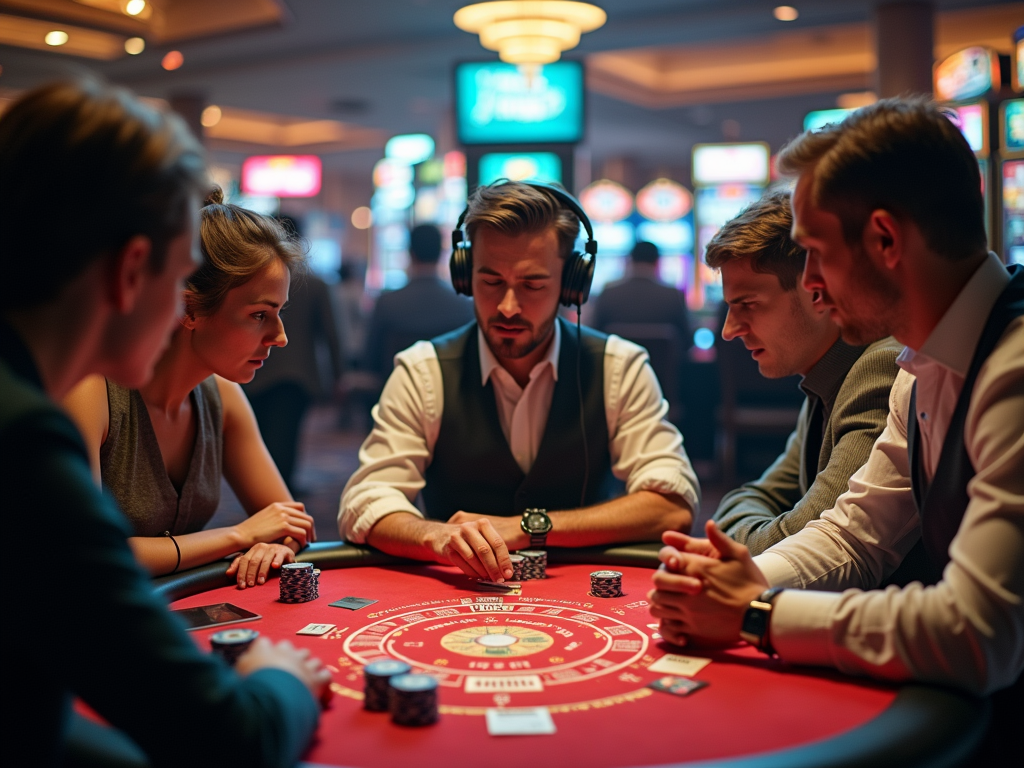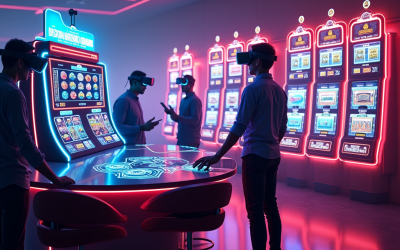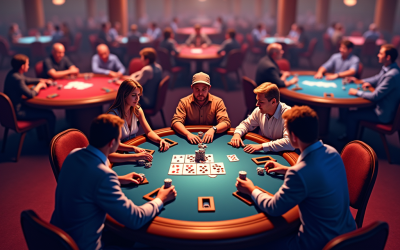Mental Discipline and Emotional Control in Blackjack
Mental discipline and emotional control form the foundation of successful blackjack play, going beyond basic mathematical strategy. Focused players minimize mistakes and maintain the lowest possible house edge through disciplined decision-making.
Key Takeaways
- Loss aversion and gambler’s fallacy act as psychological traps that disrupt strategic play
- Taking breaks every 60-90 minutes sustains mental clarity and sharp decision-making
- Warning signs of tilt show up as larger bets after losses and straying from basic strategy
- Set strict bankroll limits and stop-loss points to prevent emotional betting
- Focus on making correct decisions rather than short-term results to handle natural variance
The psychological aspects require constant attention. Each hand presents an opportunity to either maintain disciplined play or succumb to emotional reactions. Making strategic choices becomes simple with proper mental preparation and acceptance that variance exists in the short term.
My experience shows that players who track their emotional state make better decisions at the table. A clear mind leads to optimal play, while fatigue and frustration breed costly mistakes.
Setting firm monetary boundaries before playing protects against impulsive choices. This includes maximum loss limits and win goals. Once reached, I step away from the table regardless of recent results.
Success requires treating blackjack as a long-term mathematical exercise rather than a short-term emotional endeavor. The cards will fall as they may — my job is making the statistically correct play every time.
Why Our Minds Sabotage Us at the Blackjack Table
Our brains can become our biggest opponents at the blackjack table, often working against us in ways we don’t immediately notice. Loss aversion stands out as one of the most powerful psychological forces – I’ve seen countless players feel devastated about losing $50 while barely celebrating when they win the same amount.
Common Mental Traps in Blackjack
The gambler’s fallacy creates particularly sticky situations at the blackjack table. This mental trap tricks players into thinking that past results influence future outcomes. For instance, after seeing six player wins in a row, many convince themselves that the dealer “must” win the next hand – but each new deal remains completely independent.
Here are the key psychological hurdles that can derail your blackjack success:
- Loss aversion causing overly defensive play after losses
- Chasing losses with larger bets to “make up” for previous hands
- Believing in hot and cold streaks that don’t exist
- Abandoning basic strategy when emotions run high
- Overconfidence after a winning streak
These cognitive biases frequently overpower rational decision-making, even when players fully understand basic blackjack strategy. The pull of these psychological factors often proves stronger than mathematical odds in determining player behavior.
I find that emotional regulation skills make the real difference between consistent and inconsistent players. Just like in baccarat where emotional control is crucial, blackjack success depends heavily on maintaining focus and avoiding tilt.
Learning to recognize these mental traps is the first step to preventing them from affecting your play. By studying proven betting systems and strategies, you can create a structured approach that helps resist emotional decision-making.
The key lies in accepting that these psychological factors affect everyone – even experienced players. Rather than trying to eliminate them completely, I suggest developing personal techniques to manage their impact. This might include:
- Setting strict loss limits
- Taking regular breaks
- Using breathing exercises to stay centered during challenging stretches of play
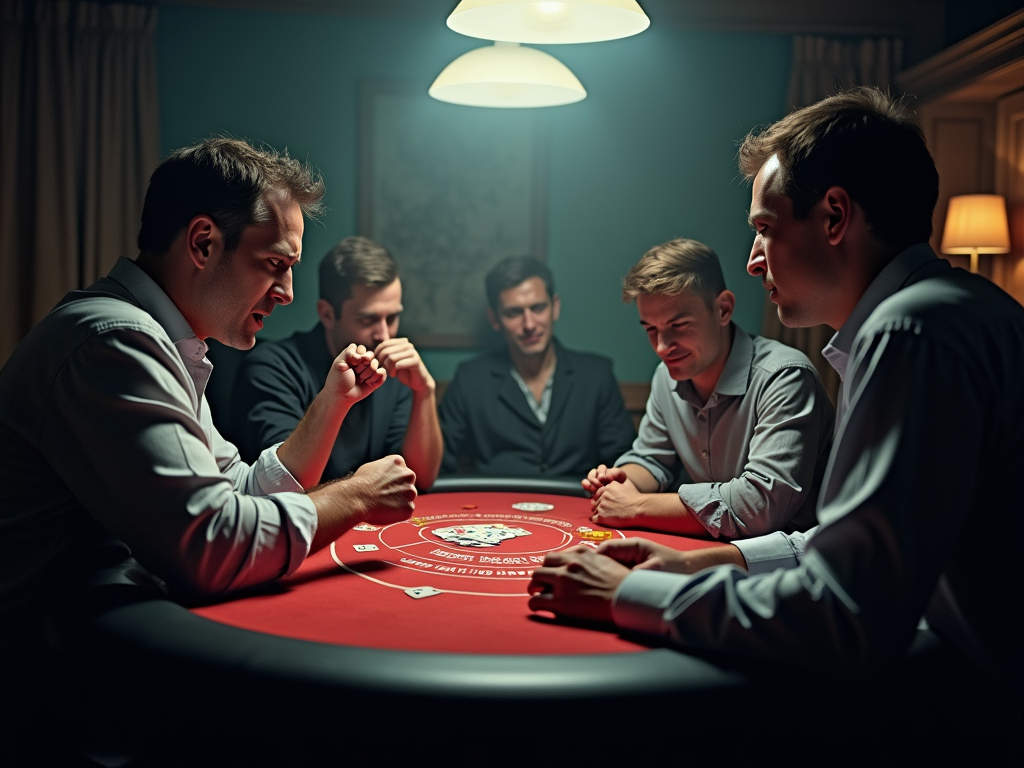
The Hidden Cost of Poor Focus: How Distractions Destroy Your Edge
A lack of focus at the blackjack table can turn a favorable game into a losing proposition faster than most players realize. Small distractions can lead to basic strategy errors that dramatically increase the house edge from 0.5% to over 2% — effectively quadrupling the casino’s advantage against you.
The Science Behind Focus and Decision Making
Even minor impairments to your cognitive function can lead to costly mistakes. Something as simple as hitting on 12 against a dealer’s 4 might seem like a small error, but these decisions compound quickly. I’ve noticed players making these fundamental mistakes most often when:
- Getting caught up in conversations with other players
- Paying attention to sports screens or entertainment
- Dealing with noise from nearby tables or slots
- Trying to multitask with phones or drinks
- Playing after consuming alcohol
Speaking of alcohol, it’s particularly important to understand its impact on your play. Blood alcohol content (BAC) levels as low as 0.02% — just one drink for many people — start to affect your decision-making abilities. This subtle impairment makes you more likely to:
- Deviate from basic strategy choices
- Chase losses with larger bets
- Misread dealer cards or your own hand
- Take unnecessary insurance bets
- Forget to track your bankroll properly
If you’re serious about maintaining your edge, I recommend treating casino games like baccarat and blackjack as skilled activities that demand your full attention. Just as you wouldn’t expect peak performance in sports or work while distracted, the same applies to making optimal decisions at the blackjack table.
To maintain peak cognitive function, limit alcohol consumption and create a personal environment that supports concentration. This might mean choosing tables away from noisy areas, wearing noise-canceling headphones, or playing during off-peak hours when the casino is calmer.
You’ll find that implementing a proper betting system and strategy becomes much easier when you’re fully focused on the game. By eliminating distractions and maintaining clear thinking, you’ll make fewer basic strategy errors and keep the house edge as low as possible.
Remember that casinos are designed to divert your attention. The flashing lights, free drinks, and constant activity aren’t accidents — they’re carefully crafted to break your concentration and lead to costly mistakes. Your job is to resist these distractions and maintain the mental discipline needed for consistent winning play.
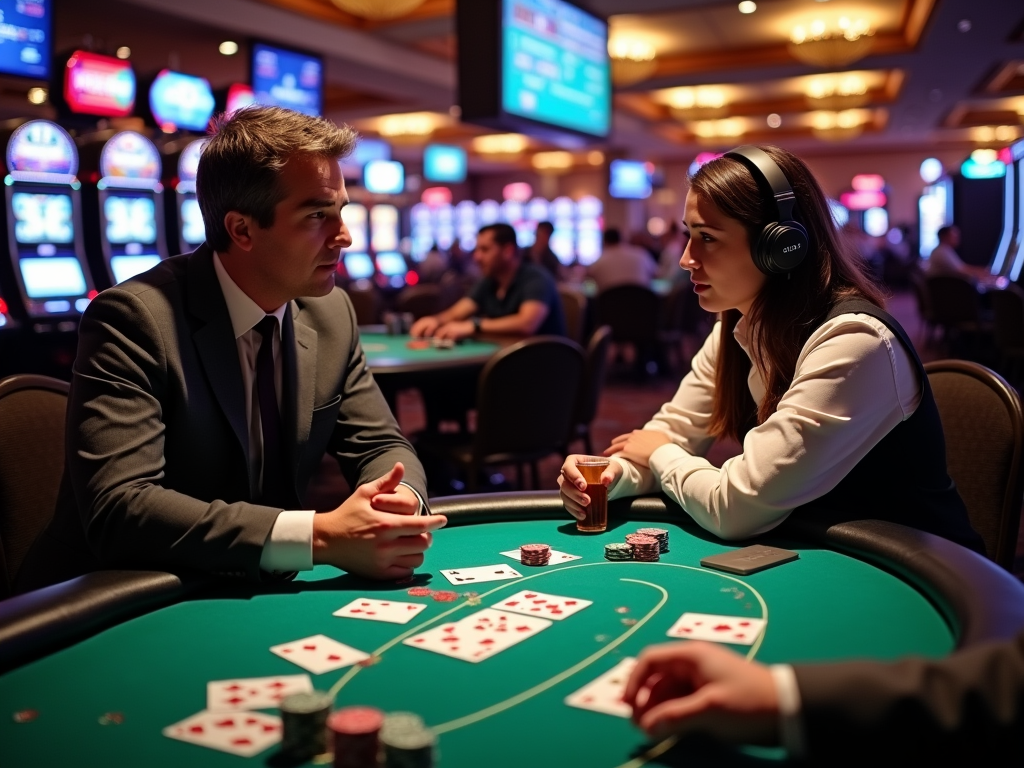
Recognizing and Controlling Tilt Before It Controls You
Playing blackjack requires a sharp mind and steady emotions, but tilt can quickly derail even the most experienced players. As someone who’s spent years at the tables, I’ve learned that recognizing the early warning signs of tilt is crucial for maintaining control.
Understanding Tilt and Its Warning Signs
Your body sends clear signals when tilt is setting in. The release of stress hormones like cortisol and adrenaline can trigger physical reactions — sweaty palms, increased heart rate, and shallow breathing. These biological responses often surface after experiencing common tilt triggers at the blackjack table.
Here are the key warning signs that indicate you’re heading into tilt territory:
- Making larger bets immediately after losses
- Deviating from basic strategy (like hitting on hard 17)
- Feeling angry at the dealer for “unfair” cards
- Believing you’re “due” for a win after losing streak
- Playing faster than usual between hands
The most dangerous aspect of tilt is how it leads to chasing losses. I’ve seen countless players spiral into aggressive betting patterns, convinced they can win back their money with one big hand. This behavior mirrors what you might see in high-stakes baccarat games, where emotional decisions can quickly drain a bankroll.
The key to preventing tilt is establishing clear boundaries before you start playing. Similar to proven betting systems in baccarat, having a structured approach to managing your emotions is essential. Set firm stop-loss limits and stick to them regardless of how you’re feeling. When you notice any tilt indicators, take a break — even a short 15-minute walk can help reset your mental state.
Remember, maintaining emotional control isn’t just about preventing losses — it’s about preserving your ability to make rational decisions based on strategy rather than feelings. By staying alert to these warning signs and taking prompt action, you can protect yourself from tilt’s destructive impact on your game and bankroll.
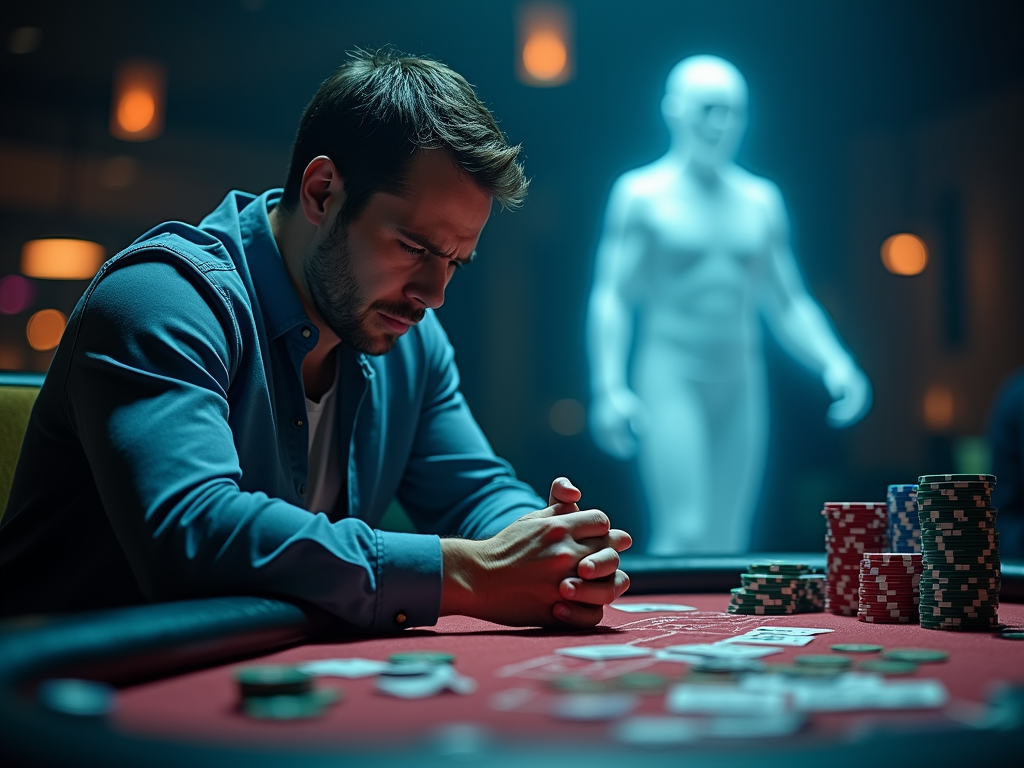
Smart Strategies to Maintain Mental Clarity
Creating an Effective Break Schedule
I recommend taking regular 10-15 minute breaks every 60-90 minutes during blackjack sessions. These strategic pauses help prevent mental exhaustion and clouded judgment that can lead to costly mistakes. Just like professional athletes need recovery periods, your brain needs time to reset and maintain peak decision-making abilities at the tables.
During these breaks, stepping away from the casino floor helps clear your mind. Taking a short walk, having a light snack, or doing some gentle stretching can refresh both your body and mental state. I find these physical activities particularly effective at combating the mental strain that comes from extended periods of strategic thinking.
Mindful Approaches to Better Play
Here are proven techniques that strengthen your mental game:
- Practice deep breathing exercises between hands to stay centered and composed
- Focus on each card played rather than dwelling on previous losses
- Remove distractions by selecting quieter tables away from busy walkways
- Skip the complimentary drinks – alcohol impairs judgment and reaction time
- Set achievable goals based on playing perfect basic strategy rather than winning specific amounts
I’ve found that implementing process-focused goals transforms the gaming experience. Rather than fixating on winning $500, aim to play each hand optimally according to basic strategy principles and guidelines. This mindset shift reduces anxiety and promotes better decision-making.
The key is developing consistent routines that work for your playing style. Some players benefit from systematic betting approaches paired with meditation, while others prefer visualization techniques. Test different methods during shorter sessions to discover what helps you maintain focus without feeling mentally drained.
Staying mentally sharp requires active effort but pays dividends through improved play. By incorporating regular breaks, mindfulness practices, and process-oriented goals, you’ll be better equipped to make optimal decisions throughout your blackjack sessions.
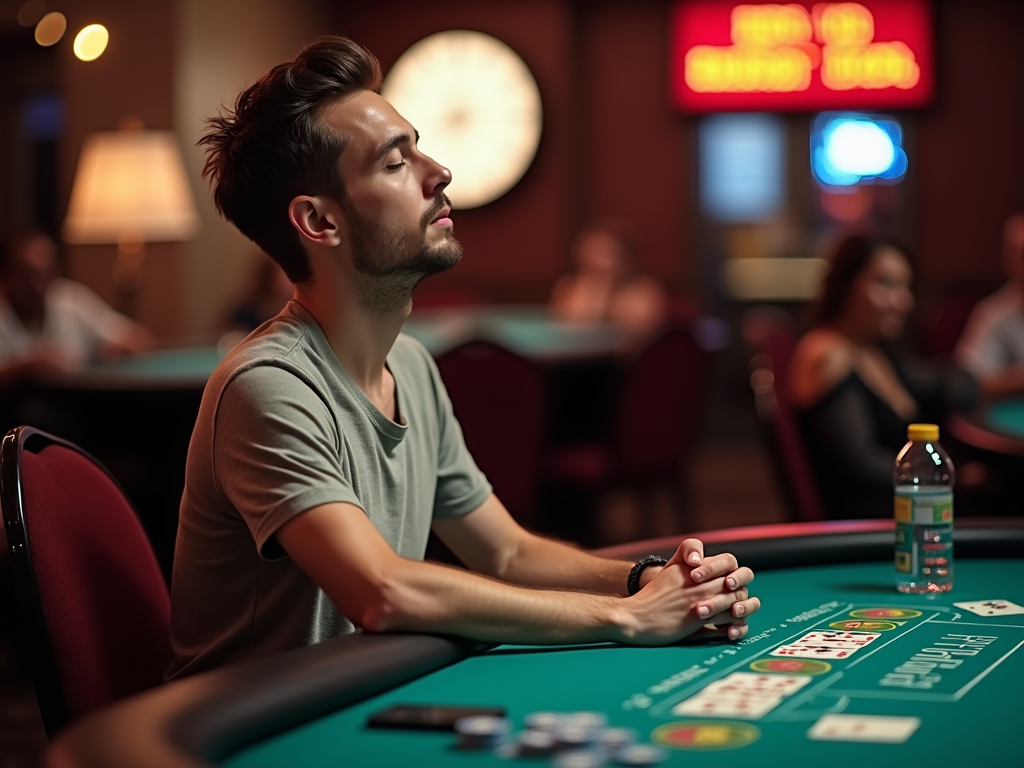
Protecting Your Bankroll Through Psychology
Smart bankroll management starts with understanding your own psychological triggers and setting firm boundaries. I’ve found that protecting your funds requires more than just mathematical skill – it demands emotional intelligence and self-awareness.
Setting Clear Financial Boundaries
The first rule of psychological bankroll protection is establishing strict betting limits. I recommend never risking more than 2-5% of your total bankroll in a single blackjack session. This percentage range helps create an emotional buffer between you and your money, making it easier to stay rational during both winning and losing streaks.
Before sitting at any blackjack table, set a non-negotiable stop-loss limit at 50% of your session stake. This isn’t just about the money – it’s about maintaining mental clarity. Here’s how to create effective psychological safeguards:
- Write down your maximum bet size and stop-loss limit before each session
- Set a timer to check your bankroll status every 30 minutes
- Keep your main bankroll separate from your session stakes
- Remove excess cash and cards from easy reach
Creating “if-then” plans for common tilt triggers can significantly improve your decision-making under pressure. Consider these psychological defense strategies:
- If I lose three hands in a row, I’ll take a 10-minute break
- If I feel angry after a dealer blackjack, I’ll step away for 5 minutes
- If I double my session stake, I’ll immediately bank half the winnings
- If I catch myself increasing bets after losses, I’ll leave the table
One particularly effective technique I use is keeping a detailed session journal. This practice helps identify emotional patterns and triggers that might otherwise go unnoticed. Track these key elements:
- Your emotional state before and after playing
- Specific hands or situations that triggered negative reactions
- The time of day and duration of your sessions
- Your win/loss patterns relative to your emotional state
These strategies combine to create a psychological framework that supports consistent smart betting decisions across all table games. Much like the structured approach found in other casino games, such as baccarat’s betting systems, blackjack requires disciplined psychological boundaries to maintain long-term success.
Remember that your mindset directly impacts your decision-making ability. By implementing these psychological safeguards, you’ll be better equipped to protect your bankroll and maintain focus during both winning and losing sessions.
Understanding Variance and Long-Term Success
The Reality of Short-Term Results
I’ve learned that one of the biggest mental challenges in blackjack is accepting that perfect strategy doesn’t guarantee winning every session. Even when making mathematically correct decisions, short-term results can swing wildly due to variance – the natural ups and downs inherent in any gambling activity.
Think of variance like waves in the ocean – some sessions you’ll ride high, while others will pull you under temporarily. The key is maintaining your composure through these fluctuations by focusing on making correct decisions rather than fixating on individual outcomes.
Embracing Expected Value
Here’s what experienced players understand about maximizing their chances at the blackjack table:
- Expected value (EV) calculations factor in both the probability of winning and the amount you’ll win or lose
- Each decision in blackjack has a mathematically optimal play based on EV
- The house edge emerges gradually over thousands of hands, not individual sessions
- Short-term luck can mask or amplify your actual skill level
The casino’s advantage works similarly to how baccarat’s house edge affects long-term results – it’s a slow, steady grind rather than dramatic swings. By separating the quality of your decisions from random short-term outcomes, you’ll develop the mental fortitude needed for sustained success.
I’ve found that tracking your play helps reinforce this long-term mindset. Record keeping lets you analyze your decision-making objectively, rather than being swayed by emotional reactions to recent results. Just like successful baccarat players who master proven betting systems, blackjack rewards those who stay disciplined and focused on sound strategy over time.
Remember that variance cuts both ways – don’t get overconfident during winning streaks or discouraged during downswings. The math behind the game doesn’t change based on recent results. By understanding how probability and variance work together, you’ll build the psychological foundation needed to play your best blackjack consistently.
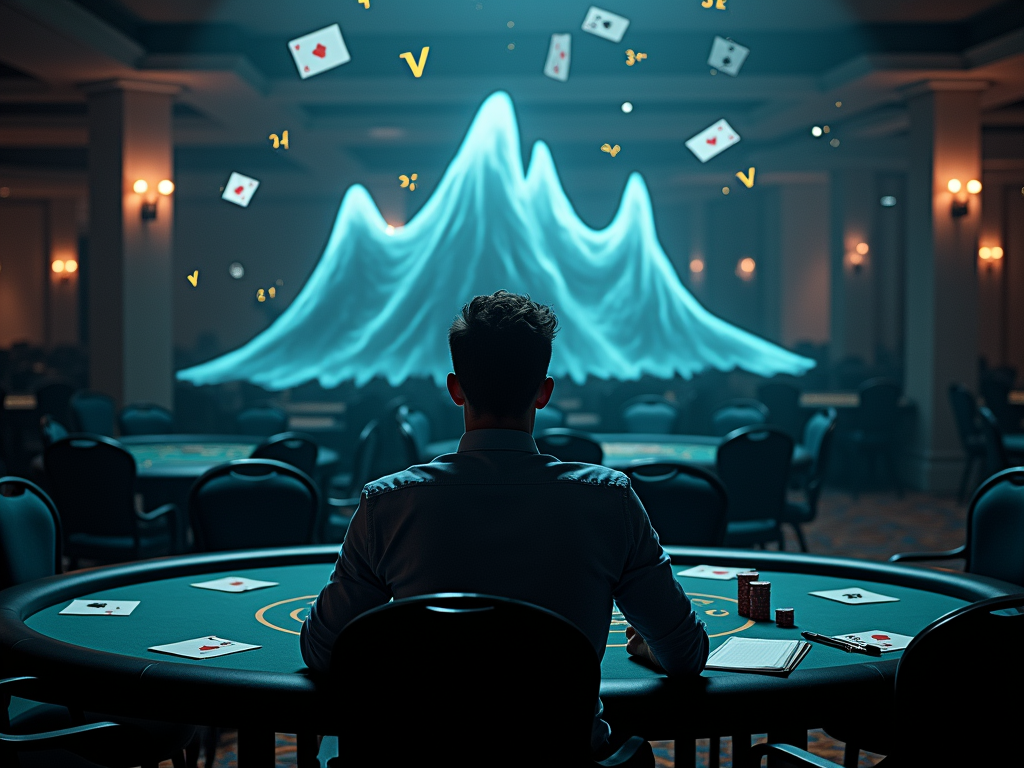
Sources:
Kahneman, Daniel. “Thinking, Fast and Slow”
Schüll, Natasha Dow. “Addiction by Design: Machine Gambling in Las Vegas”
Turner, N. E., & Stark, A. “Measuring the Effects of Tilt on Gambling Behavior”
Moskowitz, Tobias J., and L. Jon Wertheim. “Scorecasting”
American Psychological Association (APA) resources
Wizard of Odds website (Michael Shackleford)

